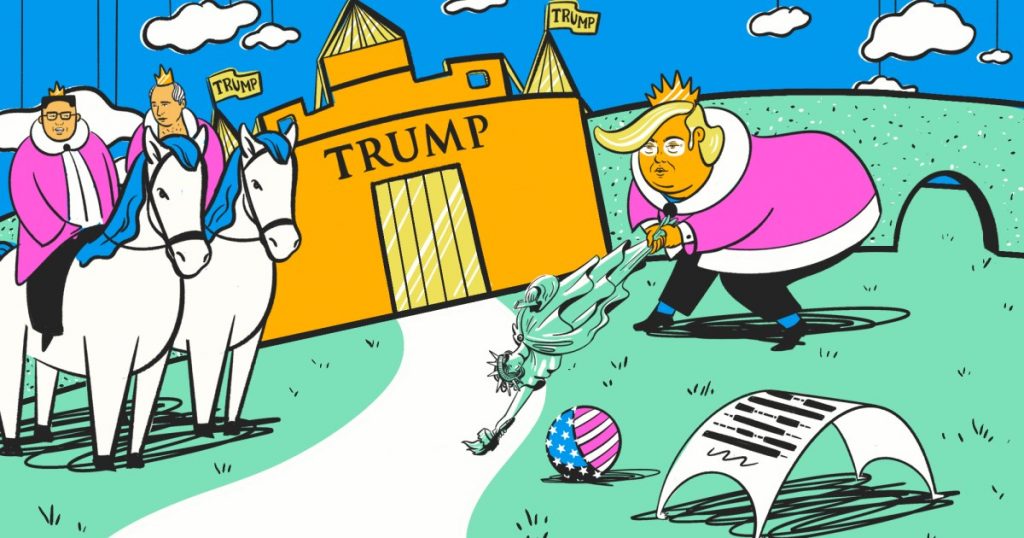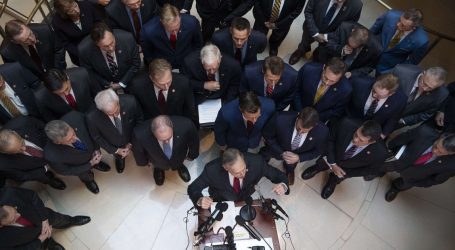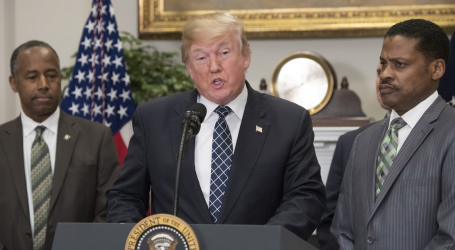There Is a Very Good Reason Why Donald Trump Thinks Everything Is Rigged
When the US targeted Russia’s oligarchs after the invasion of Ukraine, the trail of assets kept leading to our own backyard. Not only had our nation become a haven for shady foreign money, but we were also incubating a familiar class of yacht-owning, industry-dominating, resource-extracting billionaires. In the January + February 2024 issue of our magazine, we investigate the rise of American Oligarchy—and what it means for the rest of us. You can read all the pieces here.
Donald Trump is not a typical oligarch. Before entering politics, he was not part of the small group of powerful and rich people who buttressed the ruling elite. He did not build a railroad or a technology empire. His fortune—whatever its size—was not determined by a close personal connection to a head of state. As a businessman, he generally did not use his influence and wealth to advance the interests of the government or any cause. He mostly cared about one thing—himself. But essential to his own rise to wealth and power was a core component of oligarchy: exploiting a rigged system. And during both his private sector career and his time in the White House, he has been friendly to oligarchs, cutting deals with them, cozying up to oligarchic regimes, and stacking his own Cabinet with the superrich. It’s this world of immense wealth and power that Trump wishes to rule.
Trump emerged from the swamp of New York City real estate, where political connections were as important as architectural blueprints. His father, Fred, profited from that corrupt system. He took advantage of a government program to stimulate housing construction by overestimating his costs and pocketing the extra money that the Federal Housing Administration loaned him. He used a political fixer tight with the local machine to expand his real estate development business in Queens and Brooklyn.
When Donald, in his late 20s, made the leap into Manhattan real estate in the 1970s, he relied on the relationships Fred had acquired via campaign contributions. Looking to buy a large tract of land owned by the bankrupt Penn Central railroad, the young Trump arranged a key meeting with a top executive of the company and Mayor Abe Beame—an alum of the Brooklyn Democratic operation that Fred had courted with donations (despite being a registered Republican). At that sit-down, the mayor wrapped his arms around the Trumps and declared, “Whatever Donald and Fred want, they have my complete backing.” With this endorsement, Trump worked out a related deal for the Commodore Hotel, adjacent to Grand Central Terminal, and secured city tax abatements worth about $168 million. As veteran Trump chronicler Tim O’Brien later noted, the Beame-orchestrated tax breaks were “the first ever given to a commercial property in New York.”
And so it went for Trump. That hotel project led to bigger ventures in which he often gamed or ignored the rules. He cut a deal with a mobbed-up union boss to facilitate the construction of Trump Tower, and he used lawyer Roy Cohn—the onetime aide to red-baiting Sen. Joseph R. McCarthy who was then defending prominent mafiosos—to attain tax breaks for it. In the early 1980s, Trump partnered with two Mafia associates to enter the casino business in Atlantic City. When he got into trouble with gaming regulators, they gave him a pass. When he went through a series of bankruptcies in the 1990s, he wheedled his way out of one jam after another. He became notorious for not paying his bills while also receiving at least $413 million (in current dollars) from his father, much of that attained through tax dodges and fraudulent schemes. The lesson that Trump learned? Rules are for suckers.
Trump took on the aesthetics of oligarchs—all that gold and tacky displays of wealth—and became an enabler of them. His glitzy luxury properties in Manhattan and elsewhere drew wealthy overseas purchasers looking to park their money in American real estate. The Saudis, he would later say, “buy apartments from me. They spend $40 million, $50 million. Am I supposed to dislike them? I like them very much.” In 1995, he sold the Plaza Hotel to a partnership that included a Saudi prince who had reportedly purchased Trump’s yacht for around $18 million a few years earlier. As Donald Trump Jr. noted in 2008, “Russians make up a pretty disproportionate cross-section of a lot of our assets…We see a lot of money pouring in from Russia.” That year, a Russian oligarch paid Trump $95 million for a Palm Beach property that he had bought for $41 million four years earlier.
In Dubai, Trump arranged two golf course ventures with a major developer connected to the rulers of the United Arab Emirates. In 2014, he purchased a golf course in Scotland for $60 million from a holding company controlled by the government of Dubai, and he poured $200 million (the source of which is still unclear) into rehabbing the property. He hooked up with a politically wired billionaire media mogul in Indonesia to license and manage high-end resorts.
In one bizarre episode, in 2012, Trump and two of his children, Donald Jr. and Ivanka, worked closely with an Azerbaijani billionaire who apparently had ties to Iran’s Revolutionary Guard to develop a hotel in Baku, the corruption-riddled capital of the former Soviet republic. Around that time, Trump also forged a partnership with Aras Agalarov, an oligarch connected to Russian leader Vladimir Putin, to host his Miss Universe pageant in Moscow in 2013. According to Miss Universe officials, the venture had to be blessed by Putin. Trump ended up pocketing $2.3 million for the event—but only because Agalarov had subsidized the contest. In other words, Trump scored a big payday financed by a Putin-friendly oligarch. While running for president in 2016, Trump secretly sought Putin’s help to develop a Moscow tower.
More recently, Trump cooked up a deal with Oman to design a Trump-branded golf club and hotel there. The business plan calls for selling luxury villas to the well-to-do from Russia, Iran, India, and elsewhere. The venture, still under construction, has already earned Trump $5 million.
As president, Trump brought an oligarch-ish feel to the White House. He stuffed his Cabinet with plutocrats who had little or no prior government experience, including Rex Tillerson, the CEO of Exxon Mobil (secretary of state); Betsy DeVos, a member of the billionaire Amway clan (secretary of education); Steve Mnuchin, a Goldman Sachs veteran and hedge fund big shot (secretary of the treasury); and Wilbur Ross, an investor known as the “King of Bankruptcy” (secretary of commerce). A key adviser to Trump was Tom Barrack, a private equity mogul close to the autocratic Arabian Gulf governments, whom the feds charged for acting as an unregistered foreign agent for the United Arab Emirates. (He was acquitted.) Trump also installed Ivanka and her husband, Jared Kushner, in senior White House positions for which they were immensely unqualified.
Throughout his time in the White House, Trump repeatedly expressed admiration for the dictatorial leaders of oligarchic regimes. His first overseas trip as president took him to Saudi Arabia. (Kushner played a critical role in this initiative, and after Trump left the White House, Kushner’s new hedge fund received a $2 billion infusion from the Saudis.) Trump’s signature achievement as chief executive was implementing a $1.9 trillion tax cut that favored corporations and 1 percenters, including Trump himself. At the Trump International Hotel in Washington, DC—no longer in operation—foreign officials looking to curry favor with Trump booked high-priced rooms and event space. He tried to intimidate the media and undermine its independence, which in Russia and elsewhere is often the duty of oligarchs.
In most countries, the superrich have a transactional relationship with the ruling regime: They help preserve its hold on power in exchange for the opportunity to amass great wealth for themselves. But the robber barons of the United States, past and present, have forged a different type of oligarchy, in which they employ their fortunes to shape the political order and the workings of the government to their advantage. Trump has taken that further, merging his business interests fully with politics and his attempt to dominate the American political system. With his current effort at presidential restoration, Trump—who faces 91 criminal charges in four cases—is pursuing the ultimate oligarchic goal: a complete rigging of the system so it comes fully under his control, allowing him to escape all accountability and increase his riches and power. He has openly acknowledged his plan to impose authoritarian schemes should he return to the White House. (“I am your retribution,” he told an adoring crowd last March.) For Trump, oligarchy is a steppingstone to a system that poses a greater threat to American democracy: autocracy.




